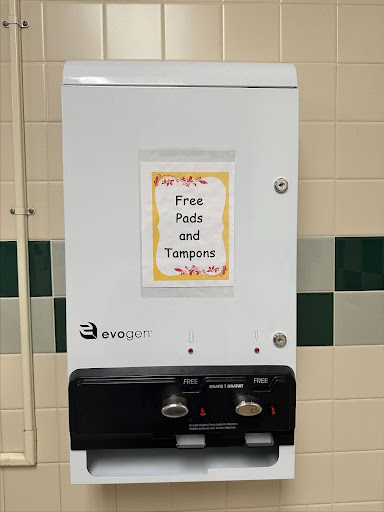
As the 2024-2025 school year kicks off, the female population of Ramapo High School is welcomed back to school by a new addition to the girls’ bathroom: free dispensaries of feminine products.
Preceding this edition, the New Jersey Legislature enacted a law mandating districts to provide products for students in grades 6-12 and allocate funds to reimburse districts for the cost. Mrs. Perry, the head of guidance in the Ramapo-Indian Hills School District, shared that the new bathroom additions are part of a larger movement to destigmatize menstrual cycles, a trend that is swiftly gaining support throughout schools in New Jersey thanks to the work of the Murphy Administration. According to NJ.Gov, Democratic Governor of New Jersey, Phil Murphy, signed a bill into legislation (S-1221/A-1349) on October 23, 2023, “…requiring school districts to provide menstrual products free of charge in every public school teaching students in one or more of grades six through twelve.” The Murphy Administration works to address other related issues including “period poverty” and the “Pink Tax” to increase access to free feminine hygiene products in schools, and to decrease the stigma surrounding menstrual cycles. Through this act, New Jersey became the twenty-third state in the country to provide menstrual products in schools (NJ.Gov).
The “Pink Tax” is a term used to describe the theory that companies market products to women that are more expensive than nearly identical products targeted toward men. This disparity proves to be disadvantageous to women in numerous ways, including accessibility and affordability of personal care items. Now.org states, “Many ‘personal care’ items include everyday necessities such as pads, tampons, and other menstrual products. Due to not being considered essential goods, they do not receive the same tax exemption as items such as grocery produce, canned foods, and prescription medicines. This distinction is known as the tampon tax, ‘which taxes menstrual products as non-essential items, places an additional burden on people who menstruate, and discriminates against them by making items crucial for everyday life unaffordable for some’” (Now.org).
Other states have joined the effort to address this gender-based inequity by eliminating taxes on menstrual products, but federally, these items are still not considered “essential” items, and women around the United States continue to suffer from a lack of access to these vital products. A study from 2021 revealed that nearly one in every four teenagers throughout the United States struggles to afford menstrual products. This price disparity especially impacts students of color and low-income families (NJ.Gov).
The Ramapo Student body sends a special thanks to the Ramapo-Indian Hills School District for doing their part in the fight against the Pink Tax!





